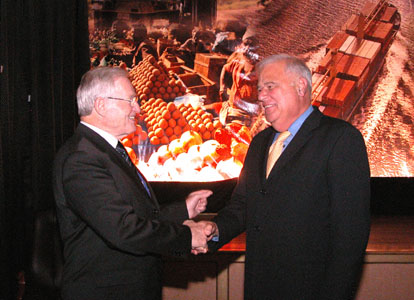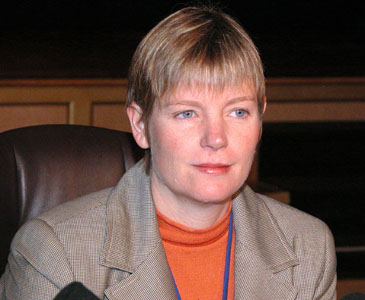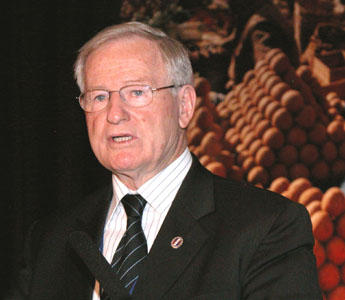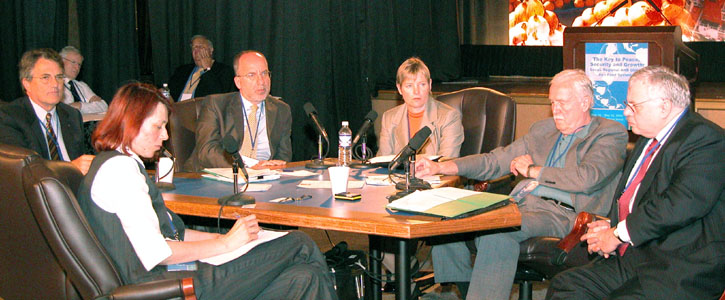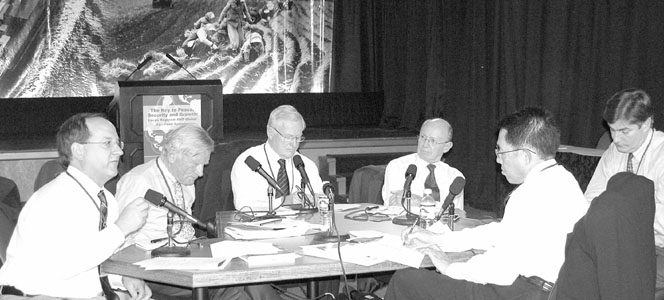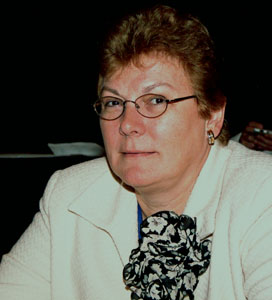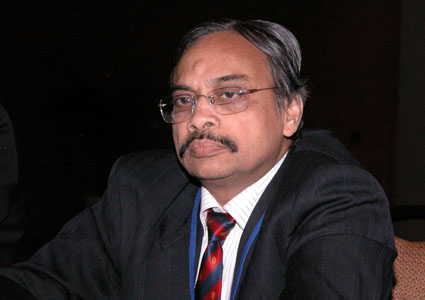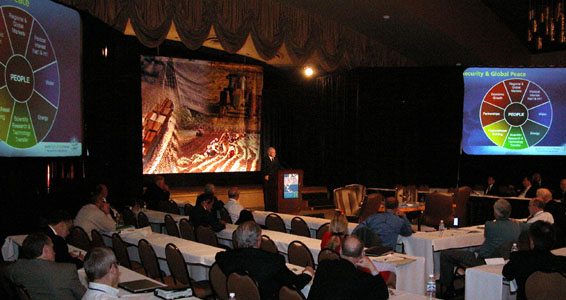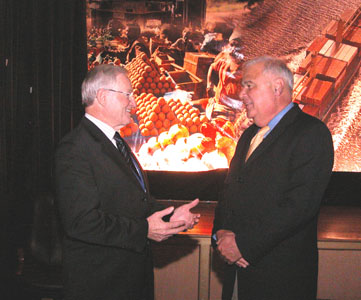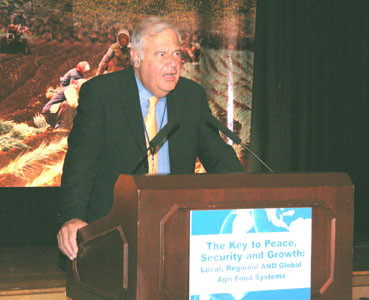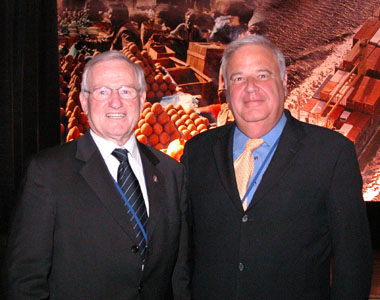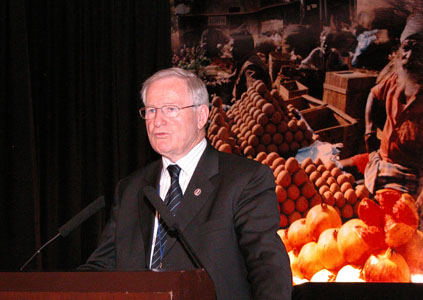|
Above
photo L-R: Jonathan Campaigne, Urszula
Budzich-Szukala, Carlo Barbieri, Deborah
Perkins, John Hatch, and Rolando Ariel
Perez
Carlo Barbieri, Professor of International
Relations, ICCREA, said working with the cooperative banking system helped the
cooperative banks in Italy rediscover their roots. Jonathan
Campaigne, Executive Director, Pride Africa, said small holder self help groups and cooperative banking
has been unreliable in Africa and explained how a network for sharing
information on financing and marketing was developed in Africa.
Urszula Budzich-Szukala, Director, Agroline Rural
Development and Credit Programme, said that at the
start of its accession to the EU, Polish agriculture was not
functioning in market conditions, which led to inefficiencies and
unemployment. Rolando Ariel
Perez, Managing Director, Maple Commercial Finance Group, said one of the outcomes of the WTO
Uruguay Round was the creation of a cash exchange for agricultural products in Latin America.
John Hatch, Founder and President, FINCA International, described
a village banking system serving millions of clients
and providing access to credit, a safe place for savings, and empowerment for the villagers.
|
|
|
|
|
|
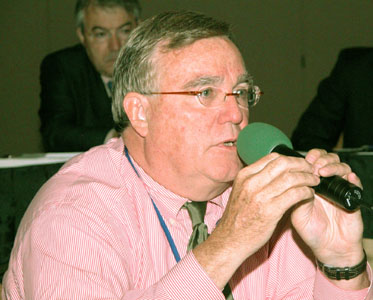
|
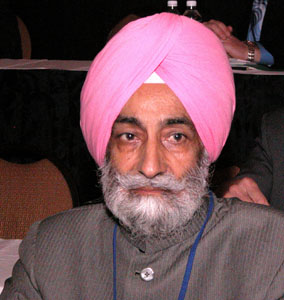
|
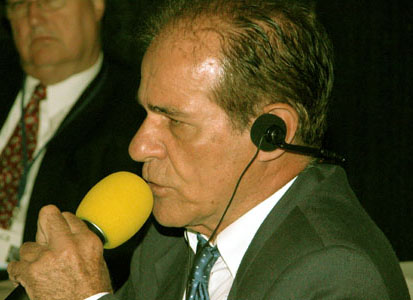
|
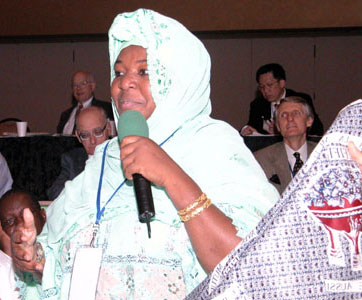
|
|
|
|
|
|
Above
photos L-R: Dick Fleming, President and CEO, St. Louis Regional Chamber and Growth Association, inquired about panelists' experiences in building equity for farmers and entrepreneurs.
Bhupinder Singh Mann, National President Bharti Kisan Union,
India, drew attention to the suicide rate of Indian farmers who cannot repay their loans and questioned how loss making ventures can be turned into profit making so farmers can repay their loans.
Jose Garcia Gasques, Coordinator
General of Strategic Planning, Ministry of Agriculture,
Livestock and Food Supply of Brazil, drew attention to the
Brazilian microcredit experience, which began in 1994, and
where the rate of return is around 99%. Hassane Amina
Wangari, WABNET, highlighted her experience with microcredit, saying that microfinance is the best way to fight poverty and to return dignity to women.
|
|
|
|
|
|
|
ROUNDTABLE: SUCCESS
THROUGH PARTNERSHIPS
|
|
|

|
|
Above photo L-R: Jim Thompson, Tensie Whelan,
Paul Carothers, and David McLaughlin
Tensie Whelan, President, The Rain Forest Alliance, explained its certification initiatives on coffee, bananas and timber, noting that the goals and objectives include improved rural livelihood and well-being in Central America and Mexico.
Jim Thompson, Global Development Alliance Secretariat, USAID, noted that of the US$112.6 billion of US aid flows, about 45% consists of private capital flows to the developing world.
Highlighting his company's experience with corporate social responsibility,
David McLaughlin, Senior Director of Environmental and Social Performance, Chiquita Brands International, said its values-based management approach is based on certification schemes for social and environmental sustainability and food safety.
Paul Carothers, Vice President of Global Public Affairs, Kraft Foods, discussed Kraft's sustainable coffee programme, which uses the Rainforest Alliance Partnership to sustainability mainstream coffee markets.
|
|
|
|
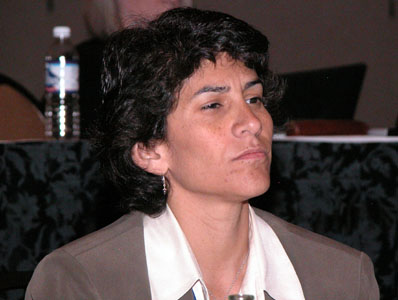
|
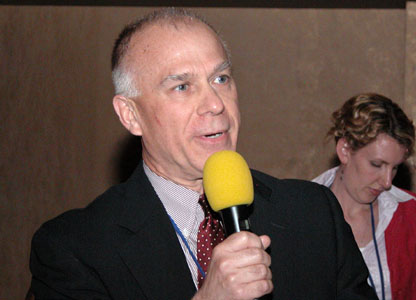
|
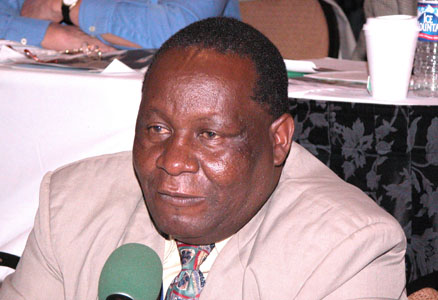 |
|
Martha Jimenez, Vice President for
Policy/Development, TransFair USA, said fair trade certifiers try to align the interests of farmers, industry
and consumers.
|
James McDonald, Vice President of Policy and
Programs, Bread for the World, clarified that of the
US$16 billion in US aid, US$6 billion is used for
development purposes and the rest is used for
foreign military spending.
|
Philip Kiriro, President, East Africa Farmers Association, asked if farmers with high quality crops will be driven out of business because of tariffs and regulations.
|
|
|
|
|
|

